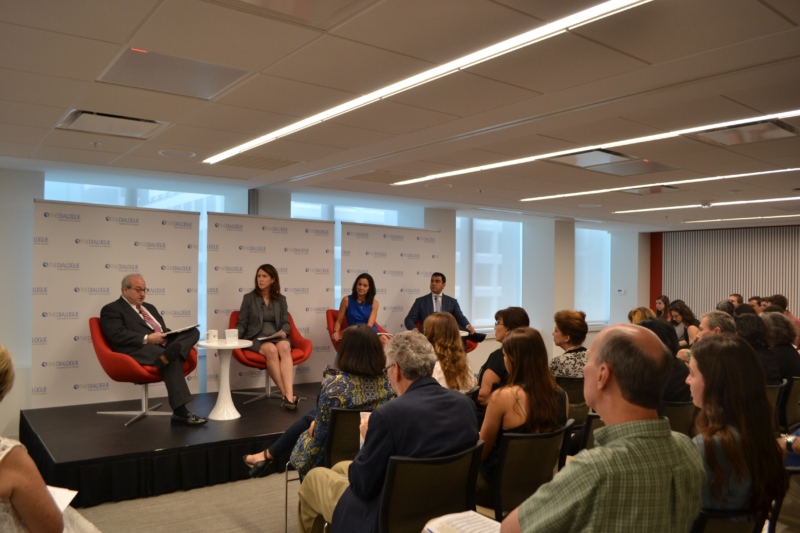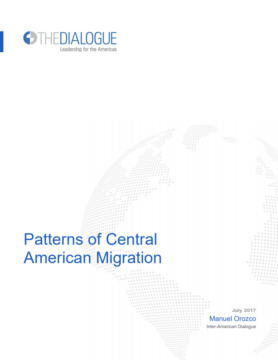Exiles are Keeping the Faith
Why do Haitians leave their homeland? How do their leaders interact with government and civic institutions in their new localities?
On June 29, the Inter-American Dialogue hosted an event titled "Immigrant Families: Separation, Reunification, and Legal Challenges." This discussion, moderated by Dialogue President Michael Shifter, featured panelists Sandra Grossman, Managing Partner and Founder of Grossman Law; Angela Kelley, Senior Strategic Advisor on Immigration at Open Society Foundations; and Manuel Orozco, Director of the Migration, Remittances and Development Program at the Dialogue. The conversation analyzed the Trump administration’s May 2018 “zero tolerance policy”, the separation of migrant children from their parents, and President Trump Executive Order signed on June 20, which ordered a stop to the separation of migrant families.
Michael Shifter opened up the conversation by discussing the immigration crisis at the US southwest border. He pointed at how current policies are unsurprising, including changes by the administration to the Deferred Action for Childhood Arrivals (DACA), Temporary Protected Status (TPS) designations.
Angela Kelley noted the intertwined nature of politics and policy, and identified some trends that have characterized the immigration policy of this administration. Kelley highlighted the 100% increase in detentions, as well as the targeting of previously low-priority-for-deportation migrants – such as DACA holders, those on family or diversity visas. She also blamed the congressional gridlock for the current chaotic situation, as Congress is unable to respond to this administration’s deviation from traditional approaches to immigration.
Kelley also discussed the discrepancy between policies and adequate implementation. This was especially visible during the execution of the June 20th Executive Order where no emphasis was placed on collecting identification information: no pictures were taken of the separated children, and non-verbal children have been asked to represent themselves in court. Kelley emphasized that there are functional, secure, and humane alternative policies like supervision programs that should be considered. Finally, she closed her remarks stating that US policy makers should and “can do better.”
Sandra Grossman shared her insights regarding legal considerations of current US immigration policy. She began by emphasizing that seeking asylum is not a crime, and is protected by both international and domestic law. However, the difficulties to access this right are only increasing, given that there is a backlog of more than 7,000 cases and Attorney General Sessions is retroactively reopening cases previously closed under administrative closure. There are also worries about how the new Supreme Court Justice may impact future immigration decisions. She underlined the importance of Angela’s comment regarding the existence of alternatives to our current immigration system, and added the example of guest worker programs, which would increase the incentive for migrants to return back to their countries. To conclude, Grossman underlined the gravity of the administration ignoring international and even national legislation. Currently, the Constitutional right to due process for claiming asylum is being ignored, and even replaced by misquoting Scriptures.
Manuel Orozco pointed out the big discrepancy between the administration's policies and the immigration reality. “Where we are right now is a very cruel and sad divide between policy and rhetoric,” he said, pointing to numbers that show decreases in overall migrants currently in the country, and increases in labor demand in the US. He also shared data regarding violence, limited growth opportunities, and overall economic stagnation in the Northern Triangle region, which are correlated with increased migration. In this regard, he spoke on the importance of understanding the ecosystem of violence in the Northern Triangle, where for example in El Salvador 90% of businesses have experienced extortion from gangs. Orozco added that the strategies and proposed investments to stop migration in the US focus too little on the importance of private investment for human development.
The event concluded with a Q&A session. Questions were raised regarding the legal possibilities of banning all Central American asylum seekers, the Flores agreement, a 1997 federal court decision which strictly limits the government’s ability to keep children in immigration detention for longer than 20 days, and the possibility of international pressure on the United States to reverse course on immigration policy. Overall, the three panelists emphasized the need for a compassionate, lawful, and smart reversal of the current immigration policy of separating and detaining migrant families, especially those seeking asylum.
Why do Haitians leave their homeland? How do their leaders interact with government and civic institutions in their new localities?
The earthquake in Haiti has exacerbated an existing distress during the international recession and increased uncertainty of what to do and how to help.
Historical legacies of civil war and poorly performing economies within the context of globalization have shaped Central American Migration.
 Inter-American Dialogue / Paulina Ortega
Inter-American Dialogue / Paulina Ortega
